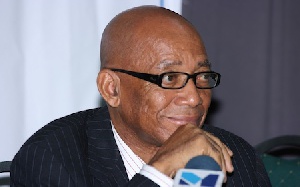Justice Emile Short, Acting Chairman for the Institute for Economic Affairs (IEA) Winner Takes All (WTA) Advisory Committee, has indicated that the practice where people were appointed in acting capacities over relatively long periods of time before they were either confirmed or relieved of their position was not the best.
Justice Short said such appointees should be confirmed quickly so as to give them more certainty to steer affairs of their institutions or organisations otherwise they should be changed quickly. He believed certainty on the part of the head would ensure improved organisational performance.
He was speaking in an interview with the Public Agenda after the IEA-WTA encounter with the media in Accra last Tuesday. The encounter was on the theme “Re-thinking Ghana's Winner-Takes-All Governance Practice.”
Addressing the press conference, Mr Short proposed that appointment of heads of key constitutional bodies and governance institutions should be made by the President with the approval of two-thirds majority members of Parliament. Alternatively, a duly constitutional independent and bi-partisan committee should advertise the vacant position, vet the applicants, draw up a short list and submit same to the President for appointment.
In addition, the IEA-WTA committee wanted those institutions to be independently funded with funds from the Telecom Tax, Consolidated Fund, National Lottery and additional 1% VAT.
The constitutional bodies in discussions are the Electoral Commission (EC), Commission on Human Rights and Administrative Justice (CHRAJ), the Supreme Court, Governor of Bank of Ghana, National Commission on Civic Education (NCCE), the Economic and Organised Crime Office (EOCO) and Office of the Auditor General.
He further stated that the current practice of appointing ministers from among Parliament weakened the institution, because Members of Parliament (MPs), who were ministers of State, could not afford to scrutinise and criticise government policies for the fear of losing their positions. He thus called for a clear separation of powers between the Executive and the Legislature.
Mrs Jean Mensa, Executive Director for the IEA, noted that since the return to constitutional, concerns have been raised about some aspects of the country's governance structure, particularly with the powers of the Presidency, district level governance, responsibilities of the Legislature, interests of and weak public Institutions.
According to Mrs Mensa, it was to help address some of the challenges in order to consolidate the country's constitutional democracy that the IEA established an 11-member Advisory Committee of Experts to re-examine the Winner-Takes-All system and to oversee the conduct of a nation-wide public consultation process on the subject as well as proposed recommendations for reforms.
General News of Saturday, 4 October 2014
Source: Public Agenda













